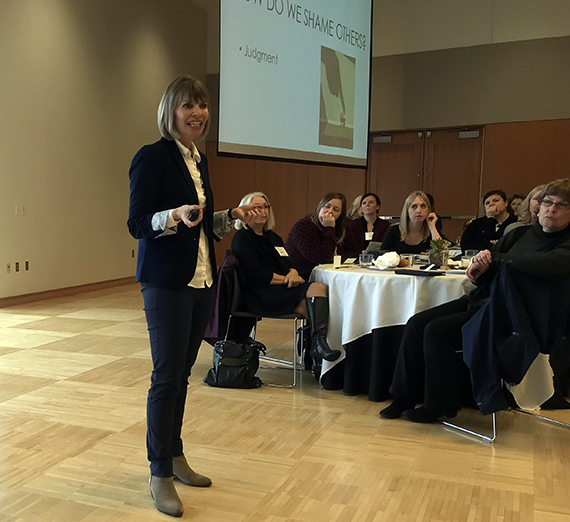Taming Shame

Gonzaga News Service
SPOKANE, Wash. — Shame is a powerful emotion that can push us toward achievement but also hold us back from realizing our potential — keeping us trapped in a web of repetitive negative self-talk on themes of being broken, undeserving and unworthy, Rachelle Strawther told a women’s leadership luncheon at Gonzaga University on Thursday.
Citing work by Brené Brown, a best-selling author and research professor at the University of Houston, Strawther said three things allow shame to grow: secrecy, silence and judgment. As we begin to question shame, dispute it, and discuss it with others, the more we can begin to let it go, she said.
“A key to this is to dispute it,” said Strawther, the director of leadership training & development for Gonzaga’s School of Leadership Studies. “The more I talk about the things that I’m afraid of, the less they hold me down.”
Shame tends to impact women and men differently, she said. Referencing the research of Brown and others, Strawther explained that shame in men often originates from perceptions of weakness and failure while women often experience it as generating contradictory messages and double binds — situations in which whatever decision one makes will be wrong — that combine to erode self-confidence.
For example, Strawther said, women are told to be physically fit — but not too muscular, because that may be deemed as unfeminine. She explained how research also shows significant gender differences in the neuroscience of confidence.
“Men tend to overrate themselves while women tend to underrate themselves,” she said, pointing out that shame is more damaging than its cousin guilt because we tend to internalize shame more as a personal character flaw, while guilt is more related to behavior.
The key to getting unstuck from self-defeating negative thoughts caused by shame, said Strawther, is to challenge the triggering thoughts as they arise.
“Pay attention to triggers. What’s going on for you at that moment? Be able to say ‘no’ and talk yourself back to a place of positivity,” she said. “When we’re triggered, that’s when the growth can happen.”
Strawther said shame is prevalent in our culture and that she has taken part in powerful, heartbreaking experiences in which people share their shame — some for the first time — and find incredible relief.
“One person said ‘I never shared this with anyone before, and it made me feel free,’” Strawther said, relating the comments of an individual who took part in an exercise in which notes of shameful experiences were anonymously written on strips of paper, redistributed and exchanged with others.
“We all have shame but we don’t have to let it define us,” Strawther said adding that it’s an incredible gift we can give one another by both sharing shame and being there to offer others the healing and reassuring words: “know, know, know that you are not alone.”
“That’s why the #MeToo Movement has been so powerful because so many women and men have been walking through their lives holding shame for things that were out of their control,” she said. “For other people to say ‘me too’ — that’s why it has been so powerful in the sharing of these experiences.
The event is part of the School of Leadership Studies' Women Lead conference series designed to educate and empower women. For more information about upcoming programs, visit www.gonzaga.edu/womenlead.
